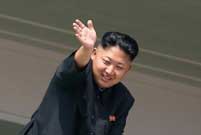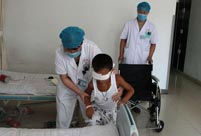MOSCOW, Sept. 10-- Ever since its establishment 12 years ago, the Shanghai Cooperation Organization (SCO) has made positive contributions to safeguarding security of its members and in the region, said the Russian special envoy to the group.
Kirill Barsky, Russian President Vladimir Putin's SCO envoy, told Xinhua in an interview prior to the upcoming SCO summit in Bishkek that the SCO has become one of the most vigorous and promising organizations in the area.
Maintaining regional stability and peace has been one of the top priorities for cooperation among the SCO members, as the region is still overshadowed by separatist elements, Barsky said.
Thanks to the SCO and its cooperation with foreign partners, terror activities have been considerably lowered in recent years, he said, adding that in this sense, the group serves as a powerful stabilizer for the region.
Foreign forces in Afghanistan planned to withdraw from the country in 2014, which would be a source of volatile factors in the country, and a big concern for the SCO members, noted the Russian diplomat.
Thus, it is quite essential for the defense and law enforcement agencies of the SCO countries to regularly hold anti-terror drills," Barsky said.
The SCO has also offered the Afghan people tremendous humanitarian assistance, which would help the country staying away from terrorism and drug-related crimes, he added.
Another challenge confronting the organization is the spread of extremist ideology, Barsky said.
To counter the threat, SCO leaders have mobilized not only law enforcement agencies but the entire society, trying to use "soft power" to deal with the threat, he said.
Apart from being a reliable pivot in fighting terrorism, separatism and extremism, the SCO also serves as a practical platform for multilateral cooperation in political, economic and cultural areas, said the Russian envoy.
He said the most important progress made by the organization in the field of economic cooperation is the formulation of a set of relatively complete rules and regulations.
Barsky added that the most pressing task for the group at the moment is to tap the potential of economic collaboration, which is huge considering the participation by China and Russia.
At the current stage, the SCO should promote cooperation in promising areas such as transportation, infrastructure, energy, agriculture, science and high technology, Barsky noted.
Since it is difficult to find projects that would be equally interesting for all, the most practical formula of economic cooperation is "2+x," which could group three or more SCO members, observers or partners, according to the envoy.
As for measures to strengthen trade and integration, Barsky said the establishment of an SCO development bank, among other tools, is feasible.
Speaking of people-to-people and cultural cooperation, Barsky said the SCO in recent years has already set many education cooperation programs in motion, and has made positive progress in promoting cultural, tourism and youth exchanges.
Such efforts are "construction blocks" for building a better SCO community, Barsky noted, adding that setting up an unimpeded channel for exchanges and communications among the peoples of the SCO nations is also a job that needs to be done.
 DPRK holds military parade to mark 65th founding anniv.
DPRK holds military parade to mark 65th founding anniv. Highlights of MAKS 2013 Int'l Aviation and Space Show
Highlights of MAKS 2013 Int'l Aviation and Space Show  10th China-ASEAN Expo opens in Nanning
10th China-ASEAN Expo opens in Nanning Eagle Boy takes to sky to break another record
Eagle Boy takes to sky to break another record 12-year-old boy becomes pillar of the family
12-year-old boy becomes pillar of the family Eye-gouged boy receives blind rehabilitation in Shanxi
Eye-gouged boy receives blind rehabilitation in Shanxi Top 10 naked hotels in the world
Top 10 naked hotels in the world The most gorgeous Chinese women in the eyes of foreigners
The most gorgeous Chinese women in the eyes of foreigners A collection of bizarre rooftop buildings around China
A collection of bizarre rooftop buildings around China Residences of the royal house of Savoy
Residences of the royal house of Savoy China's frigate 'Bengbu'in fire training
China's frigate 'Bengbu'in fire training Fresh students 'forced' to register in university independently
Fresh students 'forced' to register in university independently 2013 Taiwan Int'l Tourism Expo kicks off in Taipei
2013 Taiwan Int'l Tourism Expo kicks off in Taipei Photo story: Take a gap year
Photo story: Take a gap year Nokia's Global Headquarters: visiting a declining empire
Nokia's Global Headquarters: visiting a declining empireDay|Week|Month